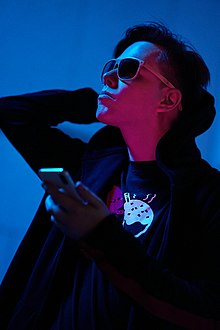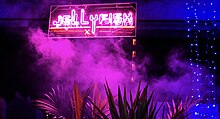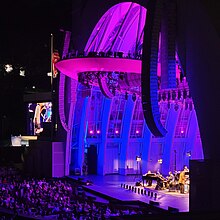
Bisexual lighting is the simultaneous use of pink, purple, and blue lighting and is used to represent bisexual characters. It has been used in studio lighting for film and television, and has been observed in the cinematography of various films. While not all films, television shows, photographs, and music videos that use this lighting intend to portray bisexuality, many queer artists have deliberately used this color palette—which resembles that of the bisexual flag—in their work.
It is reminiscent of neon lights and is also associated with retrowave.
Symbolism

George Pierpoint of BBC News writes that some social media users claim bisexual lighting has been used as an "empowering visual device" which counteracts perceived under-representation of bisexuality in the visual media. The colors may be a direct reference to the bisexual pride flag. The trend gained traction in the LGBT community in 2017 particularly on social media sites Twitter, Reddit, and Pinterest. Sasha Geffen wrote at Vulture.com that it had become "solid in its meaning", while Nicky Idika of PopBuzz wrote that it has now "become an established part of bisexual storytelling in media". And while The Daily Dot questioned whether "the aesthetic or the cultural significance first", it too concluded that the idea "has stuck". Pantone selected "Ultra Violet" as the color of 2018 in a move the BBC says reflected the growing use of the scheme.
Amelia Perrin has criticized the trend of using such lighting when bisexual characters appear in television and music videos, arguing in Cosmopolitan that this visual image "perpetuates bisexual stereotypes". Perrin argues that this kind of lighting is usually produced by neon lights, which suggest "clubs and dancefloors" to the viewer, and this implies that "bisexual hook-ups and relationships are merely 'experiments', and something that only happens when you're drunk on a night out."
According to Jessica Mason of The Mary Sue, the color purple—being a combination of multiple pure, spectral colors—has historically been used to represent "royalty and the divine," as well as "magic, aliens and the unknown." YouTuber Kyle Kallgren notes that the blue, purple, and magenta colours do not appear in nature, and had become cinematic shorthand for the unnatural. Film lecturer Lara Thompson saw the neon shades of pink and blue as part of a nostalgic trend for 1980s and 1990s aesthetics in media of the late 2010s.
History

According to BOWIE Creators, the concept of bisexual lighting was invented in 2014 by a Tumblr fan of Sherlock who believed that the lighting was being used to signal that Dr. Watson was bisexual and would eventually be in a romantic relationship with Sherlock Holmes. This brief suggestion of bisexual lighting had no direct impact on other shows, movies, or music videos containing it, but it did put the idea into the world that bisexual themes could be expressed via this color scheme. Around 2017, left-wing YouTubers such as ContraPoints (who identified as bisexual at the time) began to light their videos with pink, purple, and blue neon lights. The use of bisexual lighting became a popular meme in 2018, with multiple Twitter threads showcasing instances of the lighting scheme going viral, as well as photographs of animals in bisexual lighting being shared widely on social media.
Examples

Bisexual lighting appears across mediums, often in scenes featuring bisexual characters or referencing bisexuality. The films The Neon Demon, Atomic Blonde, and Black Panther all feature the use of blue, pink, and purple lighting. Similarly, the award-winning Black Mirror episode "San Junipero", as well as episodes from Blumhouse holiday horror anthology Into the Dark, including "I'm Just F*cking with You", "Midnight Kiss", and "My Valentine" made use of the visual aesthetic. Later, the television series Riverdale, Moonbeam City, The Assassination of Gianni Versace: American Crime Story, Voltron: Legendary Defender, and The Owl House, as well as the 2020 film Birds of Prey, were also stated to be using it. The third episode of Loki, "Lamentis", features this lighting in a scene where the title character discloses his bisexuality. The video game Ultrakill features bisexual lighting across its representation of the second circle of hell.
Bisexual lighting also features in the music videos of Janelle Monáe's "Make Me Feel," Demi Lovato's "Cool for the Summer," and Ariana Grande's "7 Rings." The term was used to describe the "electric blue and magenta pink lights" that flash during Harry Styles' song "Medicine" when he plays it on tour and in Lil Nas X's music video for "Panini". Cosmopolitan noted that some of Taylor Swift's fans cited the color palette's presence on her album cover for Lover as evidence for their long-refuted fan theories that she is bisexual and at one point dated Karlie Kloss.
Lara Thompson, a lecturer of film at Middlesex University, has argued that bisexual lighting is not well-known, stating: "I would have to see more examples before I see bisexual lighting as a wholly convincing phenomenon". According to Lillian Hochwender writing in Polygon, "Bi lighting often feels ubiquitous, even when there isn't a hint of bisexuality in sight These are the colors of magic in fantasy, alien landscapes in sci-fi, and the neon lighting of cyberpunk settings and nightclubs. Thus, while Twitter users and media critics have noted bi lighting in John Wick 3, Blade Runner 2049, Color Out of Space, Orphan: First Kill, Bingo Hell, Men in Black: International, Bullet Train and Spider-Man: Into the Spider-Verse, there's often a less gay logic for doing so."

The use of bisexual lighting became a popular meme in 2018, with multiple Twitter threads showcasing instances of the lighting scheme going viral, as well as photographs of animals in bisexual lighting being shared widely on social media. In 2022, bisexual lighting was noticed in Netflix's Heartstopper and HBO's Emmy Award-winning Euphoria. The 2022 bisexual leather film, Please Baby Please, employed bisexual lighting throughout the entire film.
See also
References
- ^ Hochwender, Lillian (February 1, 2022). "The bisexual movie canon reaches beyond the obvious". Polygon. Retrieved April 26, 2022.
- ^ Pierpoint, George (April 22, 2018). "Is 'bisexual lighting' a new cinematic phenomenon?". BBC News. Retrieved March 4, 2021.
- Bruton, Louise (April 27, 2018). "JANELLE MONÁE Dirty Computer Wondaland/Bad Boy/Atlantic". The Irish Times. Archived from the original on May 3, 2018. Retrieved May 2, 2018.
- David, Sara (February 23, 2018). "Fortify Yourself with the Beauty of Bisexual Lighting". Vice. Retrieved April 22, 2018.
- Geffen, Sasha (February 23, 2018). "Janelle Monáe Steps Into Her Bisexual Lighting". Vulture.com. Retrieved April 22, 2018.
- Idika, Nicky (February 26, 2018). "You Definitely Never Noticed The Bisexual Lighting Aesthetic...Until Now". PopBuzz. Archived from the original on April 23, 2018. Retrieved April 22, 2018.
- "'Bisexual lighting' is a having a big moment right now". The Daily Dot. February 28, 2018. Retrieved September 20, 2019.
- ^ Perrin, Amelia (March 20, 2018). "Sure, bisexual lighting looks cool, but it can be problematic". Cosmopolitan. Retrieved April 22, 2018.
- "Let's Chat About 'Bisexual Lighting'". The Mary Sue. November 27, 2019. Retrieved March 4, 2021.
- ^ Olguin, Michelle (October 7, 2021). "The Rise (and fall) of bisexual lighting | BØWIE Creators — Home of Queer & Feminist Creators". www.bowiecreators.com. Retrieved April 9, 2023.
- ^ "Fortify Yourself with the Beauty of Bisexual Lighting". Vice. February 23, 2018. Retrieved March 4, 2021.
- Jackman, Josh (February 28, 2018). "Bisexual lighting is your new favourite viral meme". PinkNews. Retrieved April 22, 2018.
- "One from the vaults: Bisexual lighting and why it's definitely a thing". Diva. September 22, 2019. Retrieved March 4, 2021.
- "How The Bisexual Lighting Meme Made Me Feel Seen". MTV UK. Retrieved November 26, 2018.
- Fleenor, S. E. (June 18, 2020). "Birds of Prey is pure bisexual disaster energy". Syfy Wire. Retrieved March 4, 2021.
- Taylor (September 22, 2020). "The Owl House Highlights its Magic with Bisexual Pride - The Fandomentals". Retrieved March 4, 2021.
- Herron, Kate. "From the moment I joined @LokiOfficial it was very important to me, and my goal, to acknowledge Loki was bisexual". Retrieved June 23, 2021.
- Shepherd, Julianne Escobedo (January 21, 2019). "Ariana Grande Is Very Sorry For Pissing People Off With '7 Rings'". Jezebel. Retrieved April 9, 2023.
- Lord, Annie (May 1, 2018). "How mainstream pop music is finally embracing bisexuality". Dazed. Retrieved July 5, 2022.
- "Lil Nas X's Panini video is here". i-D. September 5, 2019. Retrieved September 20, 2019.
- Gilmour, Paisley (August 23, 2019). "Fans think these lyrics on Taylor Swift's 'Lover' are proof she dated Karlie Kloss". Cosmopolitan. Retrieved September 20, 2019.
- "Wait, so it turns out the lighting and colours in Heartstopper have a deeper meaning". The Tab. May 5, 2022. Retrieved May 9, 2022.
- "Yes, the Bisexual Lighting in 'Heartstopper' Was Very Intentional". Netflix Tudum. Retrieved July 31, 2022.
- Herman, Alison (January 10, 2022). "'Euphoria' Doesn't Need Shock Value Anymore to Make Us Keep Watching". The Ringer. Retrieved May 9, 2022.
- Dry, Jude (October 28, 2022). "'Please Baby Please' Review: Andrea Riseborough Cuts Loose in Madcap '50s Fantasy". IndieWire. Retrieved April 9, 2023.
External links
- "Queer Colors" from TV Tropes
- Bisexual Lighting: the Rise of Pink, Purple, and Blue - a video essay by Brows Held High's Kyle Kallgren on YouTube